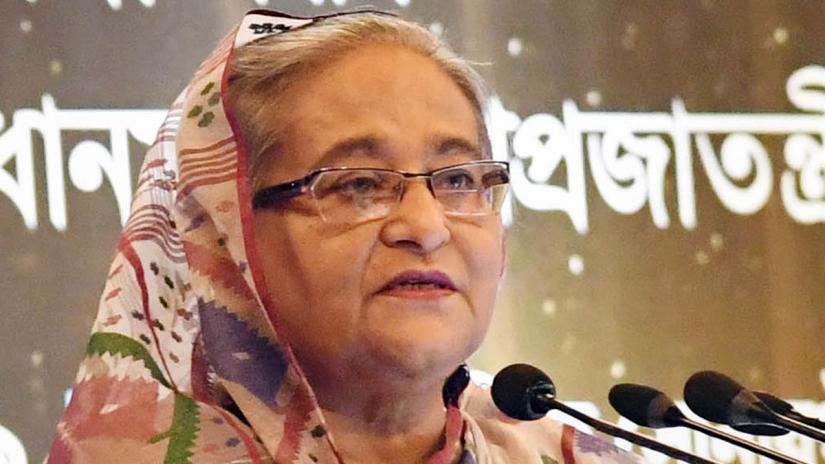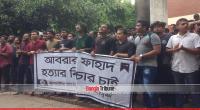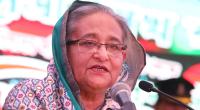 Prime Minister Sheikh Hasina inaugurated the Padma (Jashaldia) Water Treatment Plant (phase-1) and Well Field Construction Project at Tetuljhora-Bhakurta in Savar Upazila (Phase-1) with a capacity to supply 600 million litres of purified water.
Prime Minister Sheikh Hasina inaugurated the Padma (Jashaldia) Water Treatment Plant (phase-1) and Well Field Construction Project at Tetuljhora-Bhakurta in Savar Upazila (Phase-1) with a capacity to supply 600 million litres of purified water.
She also laid foundation stone of another project Gandhapur Water Treatment Plant at Rupganj in Narayanganj having capacity to treat 600 million litres of water.
The premier inaugurated and laid foundation stone of the three projects at function in a city hotel on Thursday (Oct 10), reports BSS.
Of the projects, Padma (Jashaldia) Water Treatment Plant located at the Louhajang Upazila in Mushiganj will produce 450 million litres of water while the Tetuljhora-Bhakurta Well Field Plant) in Savar Upazila (Phase-1) project will produce 150 million litres of water.
While the Gandhapur Water Treatment Plant at Rupganj in Narayanganj will treat 500 million litres once it is completed.
The plants have been constructed to meet the growing demand of drinking water of Dhaka city dwellers.
Water from the Padma River will be treated at the plant and then it will be sent to Dhaka city through a pipeline.
The construction of Padma Water Treatment Plant project is being implemented at a cost of Tk 34.51 billion.
With a view to reducing the dependency on groundwater in Mirpur, which has suffered the largest fall in the water table compared to other areas in the capital, Dhaka WASA has taken an initiative to bring 150 million litres of water per day for the neighbourhood from nearby Savar. It will cost Tk 57.3 billion.
Under the “Well field construction project at Tetuljhora-Bhakurta in Savar Upazila (Phase-1)”, 46 production wells and 48km water transmission lines will be set up to extract groundwater and supply it to Mirpur.
The premier also laid foundation stone of the Gandhapur Water Treatment Plant at Rupganj in Narayanganj under the project of Dhaka Environmentally Sustainable Water plant project.
It will be set up at a cost of about Tk 56 billion to treat 500 million litres of water from the river Meghna per day.
The project will be funded by the Asian Development Bank, the French Development Agency (AFD), the European Investment Bank and the Bangladeshi government.
Of which, 22 percent water comes from surface sources and 78 percent from ground water.
The fast-growing city of Dhaka faces a rapidly diminishing supply of groundwater, which is the main source of drinking water for its 11 million inhabitants.
A brief presentation on the three projects was given at the function
A video presentation was also screened on various projects taken by Dhaka WASA in the last 10 years to meet the growing demand of water in the capital.
 National
National
41334 hour(s) 59 minute(s) ago ;
Morning 01:54 ; Saturday ; Jul 05, 2025
PM opens two water plants, lays foundation stone of another
Send
Bangla Tribune Desk
Published : 12:03, Oct 10, 2019 | Updated : 12:05, Oct 10, 2019
Published : 12:03, Oct 10, 2019 | Updated : 12:05, Oct 10, 2019
0 ...0 ...
/pdn/
Topics: Top Stories
- KOICA donates medical supplies to BSMMU
- 5 more flights to take back British nationals to London
- Covid19: Rajarbagh, Mohammadpur worst affected
- Momen joins UN solidarity song over COVID-19 combat
- Covid-19: OIC to hold special meeting
- WFP begins food distribution in Cox’s Bazar
- WFP begins food distribution in Cox’s Bazar
- 290 return home to Australia
- Third charter flight for US citizens to return home
- Dhaka proposes to postpone D8 Summit
Unauthorized use of news, image, information, etc published by Bangla Tribune is punishable by copyright law. Appropriate legal steps will be taken by the management against any person or body that infringes those laws.
Bangla Tribune is one of the most revered online newspapers in Bangladesh, due to its reputation of neutral coverage and incisive analysis.
F R Tower, 8/C Panthapath, Shukrabad, Dhaka-1207 | Phone: 58151324; 58151326, Fax: 58151329 | Mob: 01730794527, 01730794528


